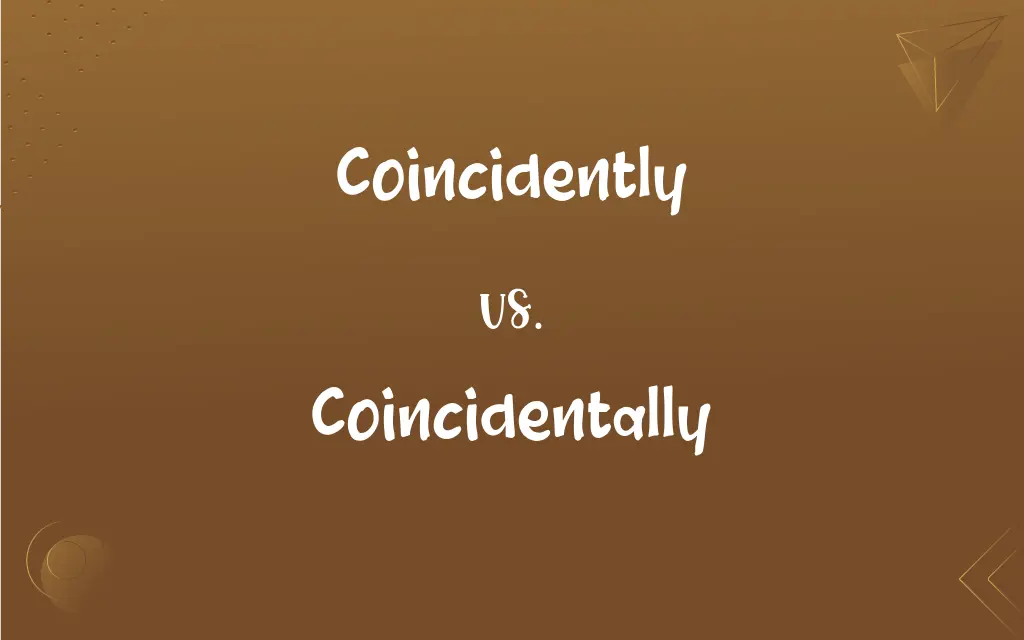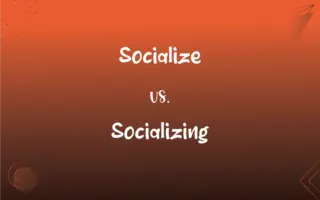Coincidently vs. Coincidentally: What's the Difference?
Edited by Janet White || By Harlon Moss || Updated on November 7, 2023
Coincidentally means happening by chance; "coincidently" is a less common variant with the same meaning.

Key Differences
"Coincidently" and "coincidentally" serve the same purpose when used in a sentence, to describe an event that occurs at the same time as another by chance. The usage of "coincidently" is less common and often considered a variant of "coincidentally," which is the more widely accepted form. Both words come from the noun "coincidence," implying a surprising concurrence of events or circumstances without apparent causal connection.
In literature, "coincidentally" is the preferred adverb to indicate that something has happened by chance in a surprising way. "Coincidently" is sometimes used in the same context, but it may not be recognized by all spell checks, as it is less standard. When writing formally or professionally, "coincidentally" is often the safer choice to ensure clarity and correct usage.
The meanings of "coincidentally" and "coincidently" overlap almost entirely, and the difference is largely in frequency of use and acceptance. "Coincidentally" has a more established place in the English language, with many considering "coincidently" an error or a nonstandard variant. Each word, when used, conveys that an action or event occurs at the same time as another, without any plan or expected outcome.
One might argue that "coincidentally" has a smoother phonetic flow, which could contribute to its preference over "coincidently" in spoken and written English. It fits better with the adverbial '-ly' ending that is typical of English adverbs. Although both are understood by speakers, the less common "coincidently" may distract or confuse readers who are more familiar with "coincidentally."
Even though "coincidentally" appears to be grammatically more conventional, there is no difference in the essential meaning when "coincidently" is used. It’s a matter of stylistic choice and adherence to the more commonly recognized forms of words in English. Given the choice between the two, most English speakers and writers would opt for "coincidentally" for clarity and conventionality.
ADVERTISEMENT
Comparison Chart
Frequency of Use
Less commonly used.
More commonly used.
Dictionary Recognition
May not be recognized by all dictionaries.
Recognized by all standard dictionaries.
Formal Acceptance
Less formally accepted.
Formally accepted and used.
Spelling Variants
Considered a variant spelling.
Standard spelling.
Perceived Correctness
May be considered incorrect or nonstandard by some.
Widely accepted as correct.
ADVERTISEMENT
Coincidently and Coincidentally Definitions
Coincidently
Happening by chance at the same time.
Coincidently, we both wore the same dress to the party.
Coincidentally
By chance or happenstance.
Coincidentally, we bumped into each other at the airport.
Coincidently
Occurring simultaneously without planning.
They arrived coincidently just as the meeting was starting.
Coincidentally
Occurring at the same time without intentional arrangement.
Coincidentally, they had chosen the same day to propose.
Coincidently
In a manner of coinciding in a position or point.
Their interests in art aligned coincidently.
Coincidentally
As an unexpected consequence of events.
Coincidentally, our ideas for the project were quite similar.
Coincidently
By a stroke of coincidence.
Coincidently, our vacation plans overlapped with theirs.
Coincidentally
At the same time as something else, by luck.
Coincidentally, the rain stopped just as the event began.
Coincidently
As a result of two events occurring at the same time by chance.
Coincidently, both news stories broke on the same day.
Coincidentally
Pertaining to two or more events happening coincidentally.
Coincidentally, the two celebrities were seen at the same venue.
Coincidently
Occurring as or resulting from coincidence.
Coincidentally
Occurring as or resulting from coincidence.
Coincidently
Happening or existing at the same time.
Coincidentally
Happening or existing at the same time.
Coincidently
Simultaneously; at the same time
Coincidentally
In a coincidental manner.
Coincidently
With coincidence.
Coincidentally
Happening at the same time
Coincidently
Happening at the same time
FAQs
How is "coincidentally" used in a sentence?
"I ran into my old school friend at the mall coincidentally."
Is "coincidently" accepted in formal writing?
"Coincidentally" is the standard form and preferred in formal writing.
What does "coincidently" mean?
"Coincidently" is a less common variant of "coincidentally" and means the same thing.
Are "coincidentally" and "coincidentally" interchangeable?
In casual use, they can be interchangeable, but "coincidentally" is the standard form.
What does "coincidentally" mean?
"Coincidentally" refers to a situation where two or more events occur at the same time by chance.
What is the adjective form of "coincidentally"?
The adjective form is "coincidental."
Can "coincidentally" imply a causal relationship?
No, "coincidentally" implies that the events are related by chance, not causation.
Is "coincidentally" an adverb?
Yes, "coincidentally" is an adverb describing how something happens.
How do you pronounce "coincidentally"?
"Coincidentally" is pronounced as \ˌkō-in(t)-ˈsi-den(t)-lē.
How do you pronounce "coincidently"?
"Coincidently" is pronounced similarly to "coincidentally": \kō-ˈin(t)-sə-den(t)-lē.
Can "coincidentally" start a sentence?
Yes, it can be used to start a sentence: "Coincidentally, we both wore the same dress."
What does "coincidental" mean?
"Coincidental" is the adjective form meaning occurring by or resulting from coincidence.
Is there a noun form of "coincidentally"?
Yes, the noun form is "coincidence."
Can "coincidentally" be used in scientific contexts?
Yes, it can describe events that occur at the same time by chance without implying a link.
What part of speech is "coincidentally"?
"Coincidentally" is an adverb.
How frequently is "coincidentally" used compared to "coincidently"?
"Coincidentally" is much more commonly used than "coincidently."
Is "coincidentally" a modern word?
"Coincidentally" has been in use since at least the early 19th century.
Can "coincidentally" be used to express sarcasm?
Yes, it can be used sarcastically to imply that an event is not entirely due to chance.
Does "coincidentally" always mean something positive?
No, "coincidentally" is neutral and can refer to any chance occurrence, positive or negative.
What is the origin of "coincidentally"?
It derives from the Latin "coincidentia," meaning "a coincidence."
About Author
Written by
Harlon MossHarlon is a seasoned quality moderator and accomplished content writer for Difference Wiki. An alumnus of the prestigious University of California, he earned his degree in Computer Science. Leveraging his academic background, Harlon brings a meticulous and informed perspective to his work, ensuring content accuracy and excellence.
Edited by
Janet WhiteJanet White has been an esteemed writer and blogger for Difference Wiki. Holding a Master's degree in Science and Medical Journalism from the prestigious Boston University, she has consistently demonstrated her expertise and passion for her field. When she's not immersed in her work, Janet relishes her time exercising, delving into a good book, and cherishing moments with friends and family.
































































